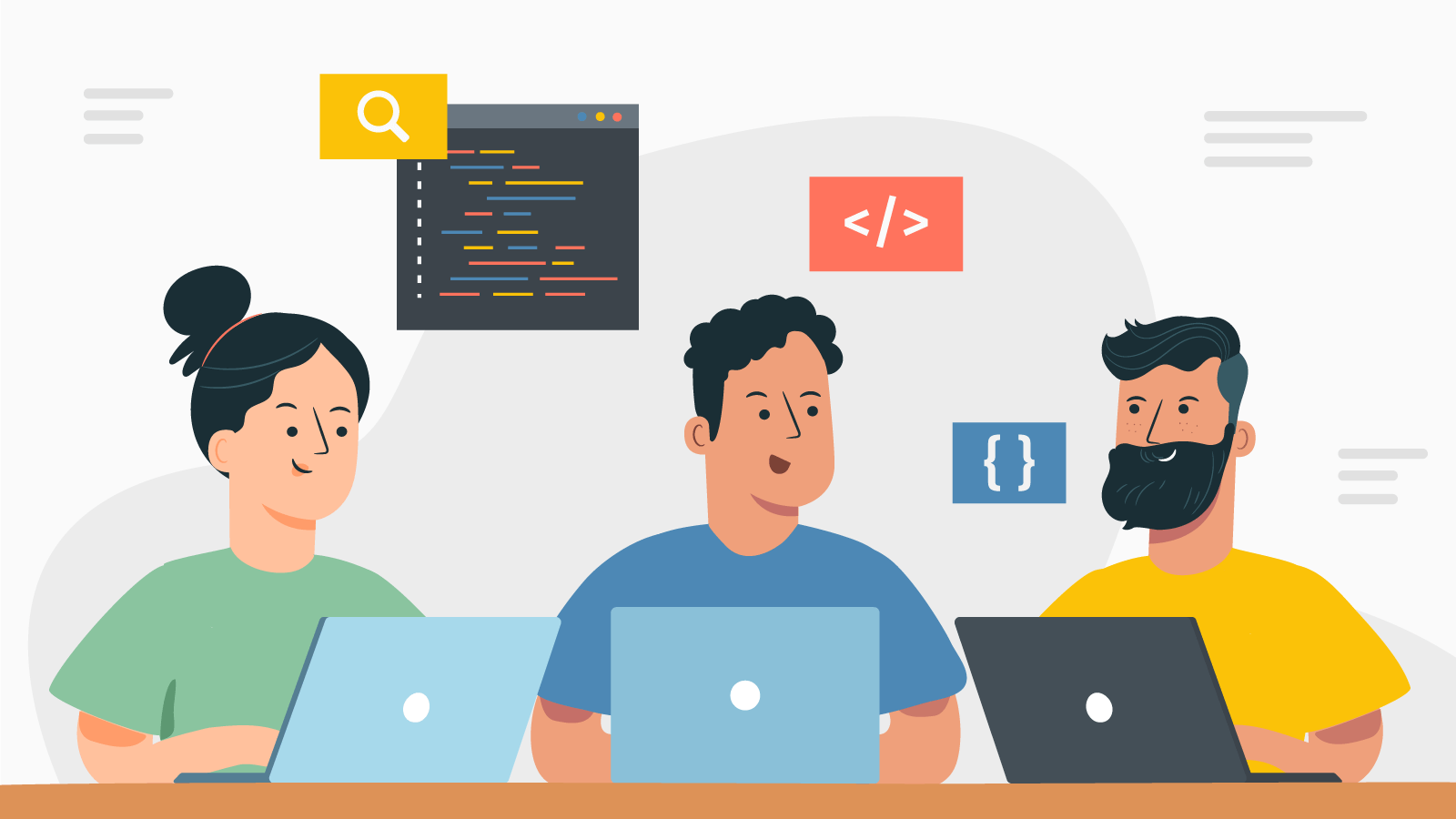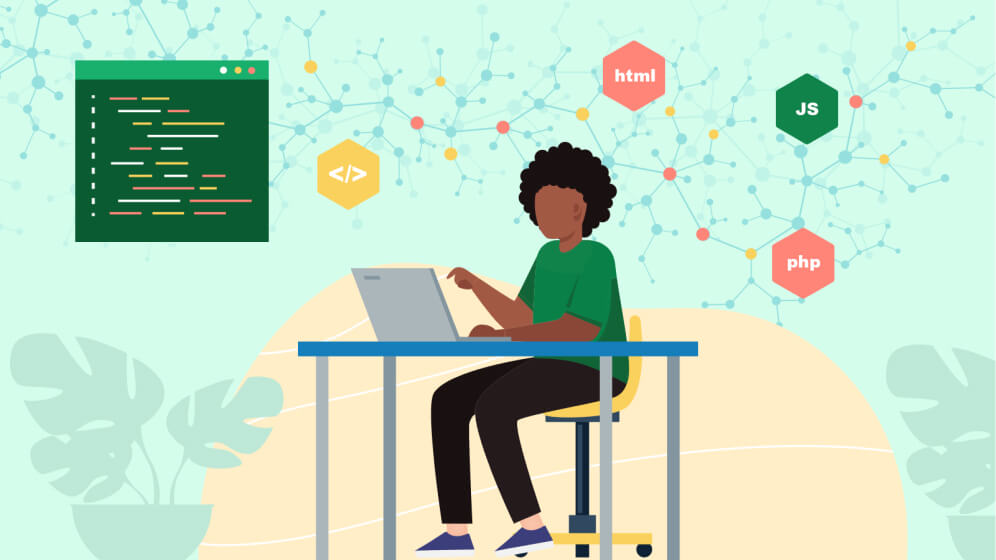Can Anyone Learn to Code? Explore the Possibilities

Becoming a software developer may seem like a dream job for some… But can anyone learn to code? It’s not a simple yes or no—it depends on the person, their motivations, and how much they’re willing to put into it.
What’s exciting is that learning to code is more accessible than ever. The resources out there are incredible—free tutorials, online courses, coding bootcamps, and communities full of people ready to help. But here’s the catch: just having access to these resources doesn’t mean you’ll succeed. Coding takes time, effort, and a lot of patience. But with the right mindset, anyone who wants to learn coding can make serious progress.
What Does “Learning to Code” Really Mean?
Before we dive in, let’s clear up a common misconception: learning to code doesn’t mean you need to become a professional developer right away - or ever. Coding is a spectrum of skills. It can mean writing a simple script to automate your daily tasks, designing a website for your side hustle, or diving into advanced fields like artificial intelligence.
Coding isn’t just a skill for tech professionals anymore. With the increasing use of software in industries like healthcare, finance, and education, having some coding knowledge can set you apart no matter your field. Even if you’re not aiming to become a full-time programmer, learning to code can be incredibly beneficial for problem-solving and automating tedious tasks.
For example, businesses today rely heavily on data. Knowing how to use Python or SQL to analyze data can make you an invaluable asset to your team. On the creative side, learning web development skills can help you build an online presence for your projects or small business.
Start by asking yourself why you want to learn coding. Is it for a career change? A personal project? Or just curiosity? Knowing your “why” will help guide your learning path. For instance, someone looking to become a web developer might focus on HTML, CSS, and JavaScript. Someone interested in data might lean towards Python or R.
Is Coding for Everyone?
Here’s a straightforward answer: coding isn’t for everyone, but it’s something almost anyone can learn if they’re willing to put in the work. Coding is more than just writing lines of code—it’s about solving problems. If you like puzzles, breaking down challenges, and creating solutions step by step, there’s a good chance you’ll love it.
A big myth is that you need to be a math genius to code. Trust me, you don’t. Basic math is more than enough for most things, especially if you’re building websites or apps. Sure, if you want to go into machine learning or data science, you’ll need stronger math skills. But for most people starting out, it’s more about logic and creativity than equations.
That said, coding isn’t everyone’s idea of fun. Debugging—that process of finding and fixing errors—can feel like solving an exciting mystery, but for some, it’s just exhausting. So, is coding for everyone? Not really. But if you’re curious, willing to stick with it, and open to learning, it might be the right fit for you.
Traits of Successful Coders
While coding is accessible to many, certain traits make it a better fit for some. Logical thinking, persistence, and adaptability are key. For example, when faced with a bug in your program, you need the patience to work through the issue step by step. Coding can be frustrating, but it’s also incredibly rewarding once you solve a problem.
If you’re unsure whether coding is for you, try free coding resources like Codecademy or freeCodeCamp. Experiment with simple projects and see if you enjoy the process. Remember, coding isn’t about being perfect—it’s about learning and improving.
The Joy of Building Something
One of the most fulfilling aspects of coding is the ability to create. Whether it’s building a simple calculator, a blog, or a full-fledged app, the process of bringing your ideas to life can be incredibly satisfying. I’ll never forget the thrill of seeing my first self-made website go live—it was basic, but it was mine. That feeling of accomplishment is a big motivator for many coders.
Do You Need a Degree to Be a Programmer?
Once upon a time, getting a degree in computer science was the main path to becoming a programmer. But things have changed. So, do you need a degree to be a programmer? Nope. These days, it’s all about what you can do, not where you learned it.
Tech companies are shifting their focus to skills and portfolios over formal education. That’s why coding bootcamps and online courses have become so popular—they give you the skills you need without spending four years in college. Some employers may still want a formal education to backstop your development skills. But many employers care more about seeing what you’ve built than whether or not you have a diploma.
The Rise of Coding Bootcamps
Coding bootcamps have revolutionized how people break into tech. These short-term, intensive programs are designed to teach you the skills you need to land a job quickly. Most bootcamps focus on in-demand technologies like JavaScript, React, and Python, and many offer job placement support.
However, bootcamps aren’t for everyone. They require a significant time and financial investment. If you’re considering this route, make sure to research the program thoroughly. Look for reviews, alumni success stories, and partnerships with employers.
Higher Learning Resources to Help You Learn to Code
In addition to bootcamps, there are several other resources that can help you learn to code effectively. One of these is MOOCs (Massive Open Online Courses) like Coursera or edX, which offer courses from prestigious universities. Many of these courses are free to audit and provide a structured approach to learning, complete with video lectures, exercises, and community support.
Another great resource is interactive coding platforms like LeetCode or HackerRank. These platforms offer coding challenges that range from beginner to advanced levels, making it easier to practice your skills in a hands-on way. They also help you prepare for coding interviews, which can be valuable if you’re aiming for a tech job.
If you prefer learning on the go, consider using popular coding apps like SoloLearn or Brilliant offers bite-sized lessons across a variety of programming languages, making it easy to get started regardless of your background. Grasshopper, developed by Google, focuses on teaching coding fundamentals through fun, interactive puzzles that are perfect for beginners. Both apps are great options for fitting coding practice into a busy schedule.
Can You Become a Programmer Without a Degree?
Absolutely. In fact, there are so many ways to break into programming these days that a degree feels optional for most people. If you want to learn, start small. Maybe it’s an online course, a coding bootcamp, or even just building your own projects.
At CKSource, for example, we look for problem-solving abilities and coding knowledge. If you have a portfolio that shows off your work, that speaks louder than any piece of paper. The takeaway? A degree can help, but it’s not a deal-breaker.
Another great way to break into programming is by contributing to open-source projects. Open-source communities are typically welcoming to newcomers, and they offer a chance to work on real-world projects while learning. By collaborating with others, you can gain valuable insights, improve your coding skills, and even add substantial contributions to your portfolio. Plus, it can be an excellent way to connect with other developers and expand your network.
Additionally, participating in hackathons or coding competitions can help you learn and grow as a programmer. These events provide an opportunity to solve challenges within a limited time frame, encouraging you to think critically and work efficiently. They can also be a fantastic way to get exposure to new tools, frameworks, and teammates, enhancing both your technical and collaborative skills. Many successful programmers have credited hackathons as a pivotal part of their learning experience.
My Journey as an Example
Take my story as an example. I started coding as a teenager out of necessity—I wanted to build my own website. I didn’t have a formal background in programming, but I taught myself HTML over the course of a few months. That small beginning turned into a passion for coding websites, working on embedded hardware, and even automating parts of the silicon chip design process. Every step of the journey was self-taught and driven by curiosity. It shows that with dedication and a clear goal, it’s possible to make progress—even without a degree.
Stories like this highlight the power of persistence. It’s not about where you start; it’s about how far you’re willing to go.
Benefits of Learning to Code
Why should you learn to code? Let’s start with the obvious: career opportunities in coding. Developers are in high demand, and that’s not slowing down anytime soon. Roles like web developer, software engineer, and mobile app developer often come with competitive salaries and job security.
Another important benefit of learning to code is the flexibility it offers in terms of career choices. Coding skills are valuable not only for traditional tech roles but also in fields like finance, marketing, and even creative industries. Many non-technical jobs are increasingly incorporating technical aspects, and having coding knowledge can set you apart from others in your field. This ability to transition into various roles is one of the key advantages of understanding programming.
Furthermore, coding can boost your problem-solving abilities and logical thinking. The process of coding forces you to break down problems into smaller, manageable tasks, and this practice is transferrable to other areas of life. Whether you’re strategizing a work project, managing your personal finances, or even planning a trip, the structured thinking that comes with coding can help you handle complexity more effectively. It’s a skill that enhances both your professional and personal life.
Beyond the Paycheck
While the financial benefits of coding are certainly appealing, there is much more to it than just the paycheck. There’s something deeply satisfying about creating something from nothing. It could be a website, a tool that solves a problem, or even a small game. Watching your ideas come to life is incredibly rewarding.
Coding also gives you freedom. Want to work remotely? Go for it. Dream of freelancing or starting your own business? Coding skills can get you there. It’s also a fantastic tool for personal projects. Automate repetitive tasks, analyze data, or build something fun—there’s no limit to what you can create.
At CKSource, we see how coding empowers people to explore new roles. From junior developers learning new skills to experienced programmers tackling ambitious projects, coding opens doors at every level. Check out the career opportunities in coding at CKSource, and contact us today if you think you are a fit for our needs!
Broad Applications in the Real World
Another advantage of coding is how broadly it applies across industries. In healthcare, coders are helping design systems to manage patient records or even create predictive models for disease outbreaks. In education, coding powers platforms that make learning more accessible, like adaptive learning software tailored to individual students’ needs.
Even industries that don’t seem tech-heavy, like agriculture, benefit from coding. Precision farming, where data helps optimize crop yields, depends on coders to build and maintain those systems. Learning to code allows you to have a tangible impact in these fields.
Challenges in Learning to Code
But let’s be real: coding isn’t always easy. One of the biggest hurdles is that overwhelming feeling when you start. There are so many languages, tools, and frameworks. Where do you even begin?
This sense of being overwhelmed is completely normal, and many new learners experience it. The key is to remember that you don’t have to learn everything all at once. Start with a single language, focus on mastering the basics, and gradually expand your knowledge. Breaking the process into smaller steps can make it far more manageable and less intimidating. Additionally, reminding yourself that it’s okay to take things slowly can help you overcome this initial hurdle.
Overcoming the Learning Curve
My advice? Pick one language to start with. Python is a favorite for beginners because it’s straightforward and versatile. Focus on mastering the basics before moving on to advanced topics. Starting small makes the process less intimidating.
Consistency is another tactic. Coding isn’t something you can learn passively. You have to write code, make mistakes, fix those mistakes, and repeat. That’s how you learn. Debugging, in particular, can be frustrating, but it’s also one of the most valuable skills you’ll develop.
Keeping Motivation High
Staying motivated can be tough. Some days, progress will feel slow. That’s normal. The key is to set small, achievable goals. Build a simple project, celebrate your wins, and keep going. Remember, every expert coder was a beginner once.
Building Community and Getting Support
One of the best ways to stay motivated is to find a community. Coding can feel isolating if you’re learning on your own, but it doesn’t have to be. Online forums like Stack Overflow, Reddit, or Discord communities are full of people who’ve been where you are and are happy to help. Don’t underestimate the power of learning alongside others.
Conclusion: Can Anyone Become a Programmer?
So, can anyone become a programmer? The short answer is yes—with the right resources, mindset, and effort. But the longer answer is that while nearly anyone can learn to code, not everyone will enjoy it. It’s a journey that requires curiosity, persistence, and a love for solving problems. If you have those, you’re already off to a great start.
The tech world is constantly changing, and coding gives you the tools to adapt and thrive. Whether you want to learn coding to kick-start your career, tackle personal projects, or just try something new, there’s never been a better time to begin.
Another important aspect of learning to code is building resilience. Coding is full of challenges and unexpected obstacles, and how you deal with those moments determines your progress. Developing resilience means not getting discouraged when things don’t work on the first try, and instead seeing each challenge as a learning opportunity. Overcoming these hurdles helps build confidence and reinforces the notion that you are capable of solving complex problems.
Additionally, coding is a creative endeavor. The ability to take an idea and turn it into something tangible—whether it’s a website, an application, or a simple automation script—is incredibly empowering. Creativity in coding isn’t just about artistic design; it’s about finding innovative ways to solve problems, improve systems, and bring new concepts to life. This creative process makes coding both challenging and rewarding, offering a sense of satisfaction that can be hard to find elsewhere.
Remember, it’s not about being perfect. It’s about being curious, taking that first step, and keeping at it. So, what’s stopping you? Dive in, write that first line of code, and see where it takes you.


